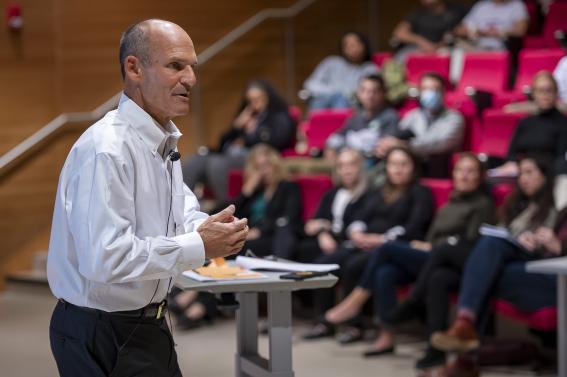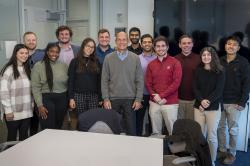“Accidental Sports Marketing Person” Harlan Stone Shares Career Insights as McCormack Executive-in-Residence
February 3, 2023

A self-proclaimed “accidental sports marketing person,” Harlan Stone has spent his four-decade career promoting brands ranging from events to teams to leagues. During his tenure as chief business officer for the U.S. Tennis Association from 2008 to 2011, for example, he set records in securing sponsorship and doubled domestic television rights, primarily through a landmark $825 million ESPN rights agreement. Stone visited the UMass Amherst campus on November 15-16 to serve as the 2022 Executive-in-Residence for the McCormack Department of Sport Management.
“They say luck is what happens when preparation meets opportunity. In my case, luck is what happened when cluelessness met fearlessness,” Stone told a packed hall in the Integrative Learning Center during the McCormack Sports Innovators Lecture. “So if I look at the first three jobs I had—Tennis Hall of Fame, Stone Sports, which was my own little agency running Legends Tennis Events, and then at age 26 running the New York Times magazine group—I was operating fearlessly, but cluelessly.”
In addition to delivering the keynote, Stone joined roundtable discussions with McCormack students and faculty, visited with club leaders, spoke in numerous classes throughout his visit, and participated in the McCormack Collection Oral History Project.
The Start of It All

Stone’s interest in sports began at a young age, when he tried out nearly every sport. It was tennis that stuck with him. As a child, he and a friend played in a nearby park almost every day after school. Stone's answer was simple when asked why he held so much love for the sport: “taking control of your own destiny.”
Stone would go on to become a scholarship tennis player for the University of Virginia Cavaliers and, upon graduation, he planned to play on a satellite tour in Sweden and Denmark. However, while standing in a train station, he saw four former classmates from UVA, and when they invited him to travel around Europe with them, he found it impossible to say no. With $1,300 to his name, Stone began his journey, locking away his rackets in a locker at the station—an action he likened to closing the door on a professional tennis career.
It was a decision Stone never came to regret.
“Realistically, I was never going to be a world-class tennis player,” Stone said in an interview. “I was really going to travel and see the world and I had stashed away enough money from teaching tennis to be able to afford to do nothing.”
However, what he did take from his time playing tennis was his “crazy competitive” side, which was vital to his successes throughout his career.
“If you enjoy competing hard in tennis or pickup basketball, or whatever it is you’re playing, you’re going to enjoy competing in business,” Stone said. “And the beauty of sales is there’s a scoreboard. But, if you have that competitive gene and like the idea of a scoreboard and like the idea of controlling something, you succeed or fail by your own wit, smarts, hard work. That’s what appealed to me.”
Building from the Ground Up

With an extensive knowledge of tennis and a passion to learn, Stone was offered a spot on the staff at the Tennis Hall of Fame. He used that as an opportunity to begin building things from the ground up, starting with his creation of the Legends Tennis Tournament.
“For me, I’ve always loved building something,” Stone said. “Once it’s built, maintaining it or managing it is not really my strong suit. Figuring out how to get something rolling. Going from a blank sheet of paper to ‘wow,’ actually it’s incredibly satisfying.”
With this same mindset, the Cadillac NFL Golf Classic was born in 1993.
Stone had a close relationship with Don Garber, an NFL marketing executive who would go on to become commissioner of Major League Soccer, who went to him with an idea for a new event.
“At that time, the players on the senior PGA tour weren’t very well known,” he said during his McCormack speech. “And few people could recognize NFL players because they were always wearing their helmets.”
His brainchild—the Cadillac NFL Golf Classic—provided a unique marketing opportunity by bringing both sports and both sets of pro athletes together to compete in an activity they would all enjoy. For 11 years, this event became one of the most financially successful for the senior tour.
Following numerous stops within the burgeoning sport sponsorship agency world, Stone chose to start his own company, called SJX Partners—the S standing for himself, J for his partner Jeff Jonas, and X because “we liked the way it sounded.” While he admitted that he could still see himself running SJX, the duo eventually sold the company to CSM Sports and Entertainment, a division of London-based Chime Communications. Stone emphasized how they were “lucky to be able to sell an agency after only four years of life.”
Stone always aimed to leave the companies in a better position than when he first got there. And, with creative thinking and innovation, he did just that throughout his impressive career.
“You have to be open to possibility,” Stone said. “No career is completely linear in the way you write it up, and I’m the perfect case. Each time I made a career change, it was not deliberate. It was happenstance. If you stay open to possibility and opportunity, for me it worked.”
By Sophie Weller